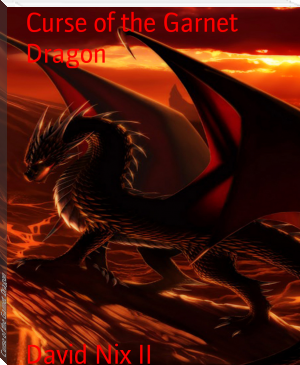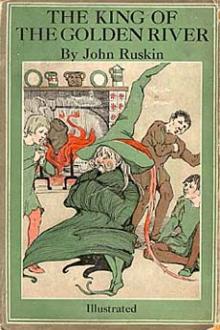Otto of the Silver Hand, Howard Pyle [good books to read for beginners TXT] 📗

- Author: Howard Pyle
Book online «Otto of the Silver Hand, Howard Pyle [good books to read for beginners TXT] 📗». Author Howard Pyle
When that happened it meant death to one and all.
They reached the crest of the hill, and down they dashed upon the other side; for there the road was smooth and level as it sloped away into the valley, but it was in dead silence that they rode. Now and then those who followed the Baron looked back over their shoulders. They had gained a mile upon their pursuers when the helmeted heads rose above the crest of the mountain, but what was the gain of a mile with a smooth road between them, and fresh horses to weary ones?
On they rode and on they rode. The sun rose higher and higher, and hotter and hotter. There was no time to rest and water their panting horses. Only once, when they crossed a shallow stretch of water, the poor animals bent their heads and caught a few gulps from the cool stream, and the One-eyed Hans washed a part of the soot from his hands and face. On and on they rode; never once did the Baron Conrad move his head or alter that steadfast look as, gazing straight before him, he rode steadily forward along the endless stretch of road, with poor little Otto’s yellow head and white face resting against his steel-clad shoulder—and St. Michaelsburg still eight leagues away.
A little rise of ground lay before them, and as they climbed it, all, excepting the baron, turned their heads as with one accord and looked behind them. Then more than one heart failed, for through the leaves of the trees below, they caught the glint of armor of those who followed—not more than a mile away. The next moment they swept over the crest, and there, below them, lay the broad shining river, and nearer a tributary stream spanned by a rude, narrow, three-arched, stone bridge where the road crossed the deep, slow-moving water.
Down the slope plodded the weary horses, and so to the bridge-head.
“Halt,” cried the baron suddenly, and drew rein.
The others stood bewildered. What did he mean to do? He turned to Hans and his blue eyes shone like steel.
“Hans,” said he, in his deep voice, “thou hast served me long and truly; wilt thou for this one last time do my bidding?”
“Aye,” said Hans, briefly.
“Swear it,” said the Baron.
“I swear it,” said Hans, and he drew the sign of the cross upon his heart.
“That is good,” said the Baron, grimly. “Then take thou this child, and with the others ride with all the speed that thou canst to St. Michaelsburg. Give the child into the charge of the Abbot Otto. Tell him how that I have sworn fealty to the Emperor, and what I have gained thereby—my castle burnt, my people slain, and this poor, simple child, my only son, mutilated by my enemy.
“And thou, my Lord Baron?” said Hans.
“I will stay here,” said the Baron, quietly, “and keep back those who follow as long as God will give me grace so to do.”
A murmur of remonstrance rose among the faithful few who were with him, two of whom were near of kin. But Conrad of Drachenhausen turned fiercely upon them.
“How now,” said he, “have I fallen so low in my troubles that even ye dare to raise your voices against me? By the good Heaven, I will begin my work here by slaying the first man who dares to raise word against my bidding.” Then he turned from them. “Here, Hans,” said he, “take the boy; and remember, knave, what thou hast sworn.”
He pressed Otto close to his breast in one last embrace. “My little child,” he murmured, “try not to hate thy father when thou thinkest of him hereafter, even though he be hard and bloody as thou knowest.”
But with his suffering and weakness, little Otto knew nothing of what was passing; it was only as in a faint flickering dream that he lived in what was done around him.
“Farewell, Otto,” said the Baron, but Otto’s lips only moved faintly in answer. His father kissed him upon either cheek. “Come, Hans,” said he, hastily, “take him hence;” and he loosed Otto’s arms from about his neck.
Hans took Otto upon the saddle in front of him.
“Oh! my dear Lord Baron,” said he, and then stopped with a gulp, and turned his grotesquely twitching face aside.
“Go,” said the Baron, harshly, “there is no time to lose in woman’s tears.”
“Farewell, Conrad! farewell, Conrad!” said his two kinsmen, and coming forward they kissed him upon the cheek then they turned and rode away after Hans, and Baron Conrad was left alone to face his mortal foe.
XIII. How Baron Conrad Held the Bridge.
As the last of his followers swept around the curving road and was lost to sight, Baron Conrad gave himself a shake, as though to drive away the thoughts that lay upon him. Then he rode slowly forward to the middle of the bridge, where he wheeled his horse so as to face his coming enemies. He lowered the vizor of his helmet and bolted it to its place, and then saw that sword and dagger were loose in the scabbard and easy to draw when the need for drawing should arise.
Down the steep path from the hill above swept the pursuing horsemen. Down the steep path to the bridge-head and there drew rein; for in the middle of the narrow way sat the motionless, steel-clad figure upon the great war-horse, with wide, red, panting nostrils, and body streaked with sweat and flecked with patches of foam.
One side of the roadway of the bridge was guarded by a low stone wall; the other side was naked and open and bare to the deep, slow-moving water beneath. It was a dangerous place to attack a desperate man clad in armor of proof.
“Forward!” cried Baron Henry, but not a soul stirred in answer, and still the iron-clad figure sat motionless and erect upon the panting horse.
“How,” cried the Baron Henry, “are ye afraid of one man? Then follow me!” and he spurred forward to the bridge-head. But still no one moved in answer, and the Lord of Trutz-Drachen reined back his horse again. He wheeled his horse and glared round upon the stolid faces of his followers, until his eyes seemed fairly to blaze with passion beneath the bars of his vizor.
Baron Conrad gave a roar of laughter. “How now,” he cried; “are ye all afraid of one man? Is there none among ye that dares come forward and meet me? I know thee, Baron Henry thou art not afraid to cut off the hand of a little child. Hast thou not now the courage to face the father?”
Baron Henry gnashed his teeth with rage as he glared around upon the faces of his men-at-arms. Suddenly his eye lit upon one of them. “Ha! Carl Spigler,” he cried, “thou hast thy cross-bow with thee;—shoot me





Comments (0)